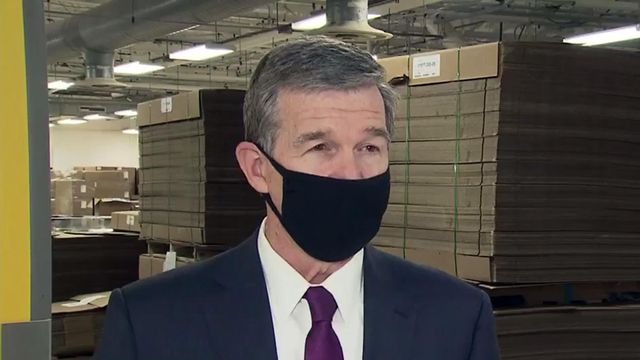NC's COVID-19 hospitalizations at all-time high
State data shows more people have died from COVID-19 so far this year than have died from the seasonal flu in the past 10 years.
Posted — UpdatedOn Thursday, a record 5,637 new coronavirus cases were reported in North Carolina, surpassing the previous record by a whopping 25 percent.
During a Dec. 1 press conference, Health Secretary Mandy Cohen shared an alarming statistic.
“Sadly, more than 5,000 North Carolinians have lost their lives from this virus since our first death on March 12 of this year,” Cohen said. “To give some perspective, just under 1,500 people died from the flu in the past 10 years. In just 11 months, COVID has killed more than three times that number.”
Cohen called the state soaring past the 5,000 mark for new cases "another devastating milestone."
"This number is alarming," Cohen said during a Thursday briefing on the pandemic.
The previous record for new cases was 4,514 on Nov. 22. Thursday's record number – it comes exactly nine months after north Carolina reported its first coronavirus case – and Friday's case count puts the rolling, seven-day average of new cases at 4,003 per day over the last week – the first time the state has ever topped 4,000.
While the spike might be attributed to the crush of testing done before Thanksgiving as people prepared for holiday gatherings, Cohen also expressed concern over the 11.4 percent rate of positive coronavirus tests.
"I am very worried," she said.
Nearly 5,500 North Carolinians have died during the pandemic, including another 57 that were reported Friday.
Gov. Roy Cooper, who was touring a Pittsboro plant that makes protective face shields and packages nasal swabs for virus tests, said he was "deeply concerned" by North Carolina's troubling trend lines.
"We’re particularly worried about the stress on our hospitals," Cooper said. "We know that it is critically important that we try to get these numbers back down."
Both Cooper and Cohen said the state's pandemic-related restrictions are enough to limit the spread of the virus – provided people abide by them. But they said they will reimpose tougher restrictions if needed.
"There are a lot of people who are doing the right thing and are following the rules, and we are grateful for that. But it’s irresponsible to ignore the rules and create situations where people can become infected," the governor said. "It is critically important that people follow these orders and that they take personal responsibility."
"We knew there was just going to be more risk of spread" over the winter holidays, Cohen said. "We know, though, what to do. We know what prevents this. ... We can all do things right now to slow the spread of this virus. We have to."
The U.S. Food and Drug Administration is scheduled to meet next week to consider an emergency use authorization for a potential vaccine made by Pfizer. Vaccine candidates from Moderna and other companies also are in the pipeline for FDA authorization.
Rural hospitals and smaller facilities in cities won't have access to that initial batch, she said, because of the cold storage requirements and the inability to break up the 1,000-dose packages into smaller units. But doses will continue to be shipped to North Carolina through late December and into January that will eventually make their way to smaller hospitals and counties.
Cohen said workers in nursing homes and health care workers who deal directly with COVID-19 patients will be the first groups targeted for vaccination in the state.
The state still hasn’t seen the full impact of travel and holiday gatherings over Thanksgiving weekend, Cooper noted. Fearing a continued surge in cases through the upcoming holidays, he continued to preach safety.
"We hope people are smart and responsible over the holidays," he said. "I hope the people who are planning to have these large gatherings will reconsider when they think about the fact that they could be putting people into the position where, not only are they making people sick who come, but everybody else who comes in contact with these people. During holidays, that’s when you see a lot of that."
Related Topics
• Credits
Copyright 2024 by Capitol Broadcasting Company. All rights reserved. This material may not be published, broadcast, rewritten or redistributed.






